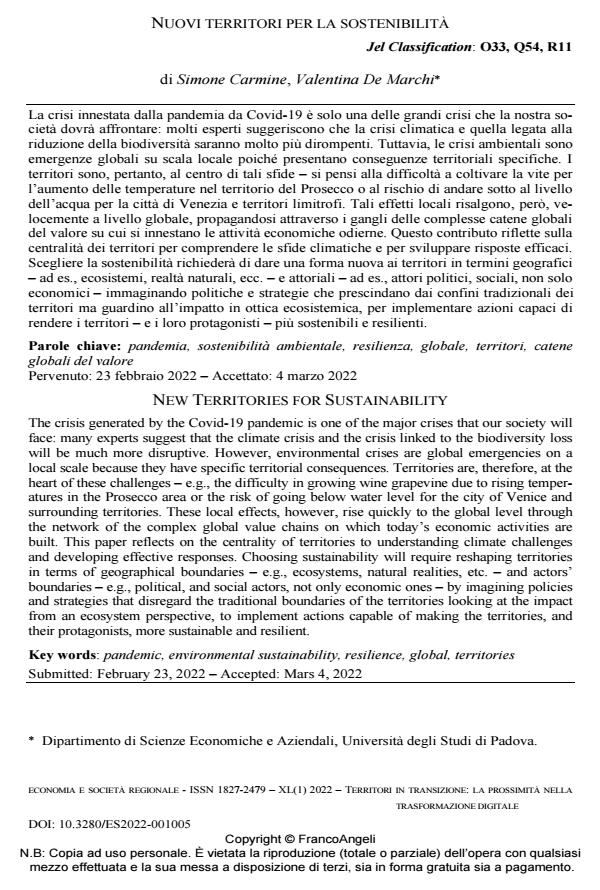Nuovi territori per la sostenibilità
Titolo Rivista ECONOMIA E SOCIETÀ REGIONALE
Autori/Curatori Simone Carmine, Valentina De Marchi
Anno di pubblicazione 2022 Fascicolo 2022/1
Lingua Italiano Numero pagine 10 P. 63-72 Dimensione file 245 KB
DOI 10.3280/ES2022-001005
Il DOI è il codice a barre della proprietà intellettuale: per saperne di più
clicca qui
Qui sotto puoi vedere in anteprima la prima pagina di questo articolo.
Se questo articolo ti interessa, lo puoi acquistare (e scaricare in formato pdf) seguendo le facili indicazioni per acquistare il download credit. Acquista Download Credits per scaricare questo Articolo in formato PDF

FrancoAngeli è membro della Publishers International Linking Association, Inc (PILA), associazione indipendente e non profit per facilitare (attraverso i servizi tecnologici implementati da CrossRef.org) l’accesso degli studiosi ai contenuti digitali nelle pubblicazioni professionali e scientifiche.
La crisi innestata dalla pandemia da Covid-19 è solo una delle grandi crisi che la nostra società dovrà affrontare: molti esperti suggeriscono che la crisi climatica e quella legata alla riduzione della biodiversità saranno molto più dirompenti. Tuttavia, le crisi ambientali sono emergenze globali su scala locale poiché presentano conseguenze territoriali specifiche. I territori sono, pertanto, al centro di tali sfide - si pensi alla difficoltà a coltivare la vite per l’aumento delle temperature nel territorio del Prosecco o al rischio di andare sotto al livello dell’acqua per la città di Venezia e territori limitrofi. Tali effetti locali risalgono, però, velocemente a livello globale, propagandosi attraverso i gangli delle complesse catene globali del valore su cui si innestano le attività economiche odierne. Questo contributo riflette sulla centralità dei territori per comprendere le sfide climatiche e per sviluppare risposte efficaci. Scegliere la sostenibilità richiederà di dare una forma nuova ai territori in termini geografici - ad es., ecosistemi, realtà naturali, ecc. - e attoriali - ad es., attori politici, sociali, non solo economici - immaginando politiche e strategie che prescindano dai confini tradizionali dei territori ma guardino all’impatto in ottica ecosistemica, per implementare azioni capaci di rendere i territori - e i loro protagonisti - più sostenibili e resilienti.
Parole chiave:pandemia, sostenibilità ambientale, resilienza, globale, territori, catene globali del valore
Jel codes:O33, Q54, R11
Simone Carmine, Valentina De Marchi, Nuovi territori per la sostenibilità in "ECONOMIA E SOCIETÀ REGIONALE " 1/2022, pp 63-72, DOI: 10.3280/ES2022-001005